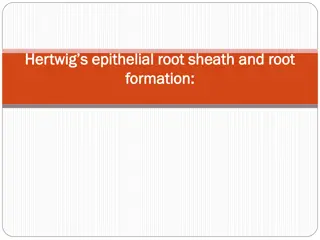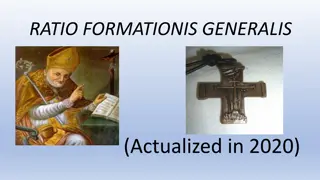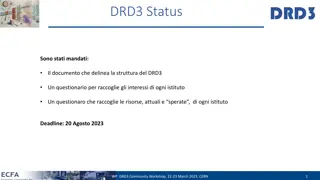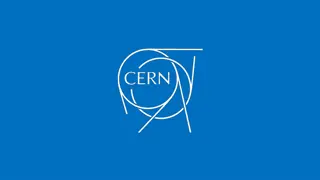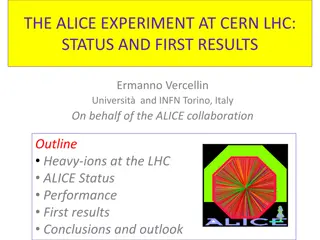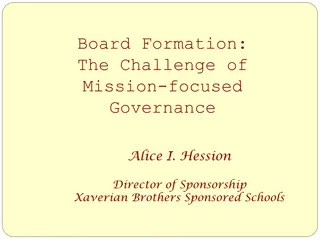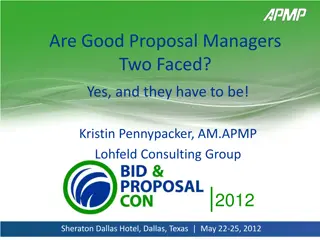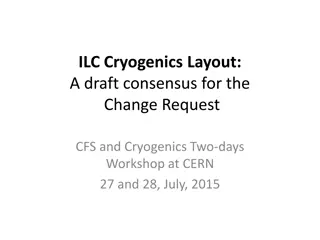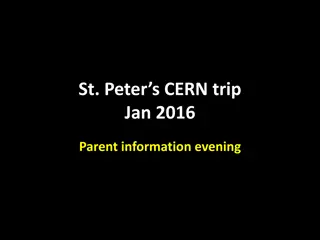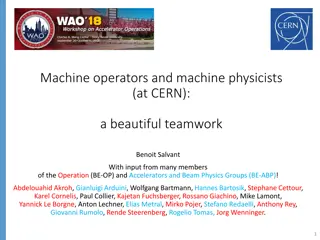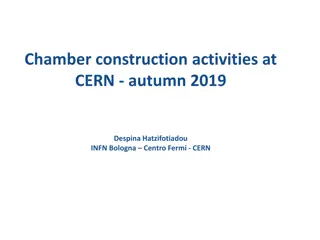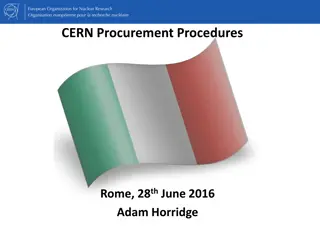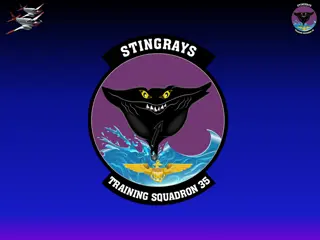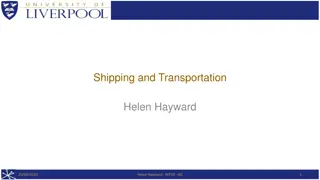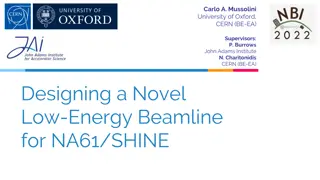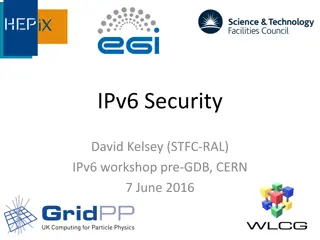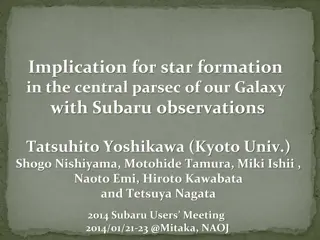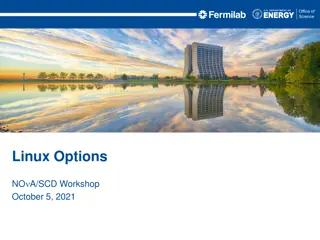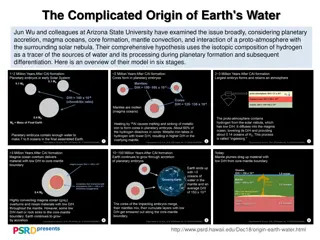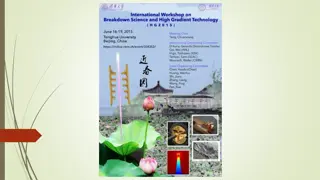DRD3 Community Workshop at CERN: Proposal Formation and Collaboration Building
DRD3 Community Workshop at CERN on 22-23 March 2023 focuses on forming the DRD3 proposal team, outlining the mandate, and organizing activities for solid-state detector research. The team's role is to guide a bottom-up process for proposal development, conduct a community survey, and facilitate collaboration formation while aligning with ECFA roadmap recommendations. The workshop aims to identify research interests, plan resources, define milestones, and prepare the DRD3 proposal for submission.
Download Presentation

Please find below an Image/Link to download the presentation.
The content on the website is provided AS IS for your information and personal use only. It may not be sold, licensed, or shared on other websites without obtaining consent from the author.If you encounter any issues during the download, it is possible that the publisher has removed the file from their server.
You are allowed to download the files provided on this website for personal or commercial use, subject to the condition that they are used lawfully. All files are the property of their respective owners.
The content on the website is provided AS IS for your information and personal use only. It may not be sold, licensed, or shared on other websites without obtaining consent from the author.
E N D
Presentation Transcript
DRD3 DRD3 Community Workshop, CERN, 22-23 March 2023 Solid-State Detectors Community Workshop Towards the DRD3 collaboration Proposal Writing Team Michael Moll CERN EP-DT, Geneva, Switzerland on behalf of the DRD3 proposal writing team 1 Introduction session -- DRD3 Community Workshop, 22-23 March 2023, CERN
DRD3 Outline The DRD3 proposal writing team composition and mandate Aim and Format of this Workshop Aim & splitting of activities into WPs DRD3 is not RD50++ some comments from RD50 perspective (Detailed discussion on DRD3 structure/organization tomorrow) Next: Survey [Nicolo] 2 Introduction session -- DRD3 Community Workshop, 22-23 March 2023, CERN
DRD3 DRD3 proposal team: members DRD3 proposal core team: formed in consensus between ECFA Roadmap TF3 conveners & RD50 management regular meetings since October 2022 mandate presented on next slide WG1: Monolithic CMOS Sensors D.Bortoletto, D.Contardo, E. Vilella Figuras, H.Pernegger WG2: Sensors for Tracking & Calorimetry N.Cartiglia, C.Gemme, A.Macchiolo WG3: Radiation damage & ultrahigh fluences M.Mikuz, M.Moll, I. Pintilie, S.Seidel WG4: Simulation M.Bomben, G.Kramberger, A.Morozzi, F.Moscatelli, J.Schwandt, S.Spannagel WG5: Characterization techniques, facilities D.Dannheim, M.Fernandez Garcia, M.Jak i , I.Vila Alvarez WG6 Non-silicon based detectors T.Bergauer, T.Koffas, A.Oh, G.Pelligrini, X.Shi WG7: Interconnect and device fabrication G.Calderini, D.Dannheim, T.Fritzsch, F.H gging WG8: Dissemination and outreach N.Cartiglia et al. Giovanni Calderini, Nicolo Cartiglia, Gianluigi Casse, Gregor Kramberger, Michael Moll, Giulio Pellegrini, Ioana Pintilie, Ivan Vila Alvarez, Eva Vilella Figueras Team extended with further experts to organize individual research lines (and sessions of this workshop) We are very open to integrate further volunteers into the teams! 3 Introduction session -- DRD3 Community Workshop, 22-23 March 2023, CERN
DRD3 DRD3 proposal team: Mandate Our mandate (as we see it) Foster and guide a community-driven bottom-up process towards the DRD3 proposal and the formation of the DRD3 collaboration Perform a survey of the solid-state detectors community R&D interests, plans and anticipated available/requested resources and evaluate these against the ECFA roadmap recommendations Organize a community-wide workshop (22/23 March 2023, see next slide for details) Conclude on milestones and deliverables and write/submit the DRD3 proposal in consensus with the community, the ECFA roadmap and within the DRDC/CERN defined boundaries Prepare & organize a constitutional workshop to form the DRD3 collaboration [END of our mandate] What we are not and what is not our mandate Team is neither an ECFA nor an RD50 or DRD3 body We are serving the detector R&D community. Team members are neither imposing nor volunteering for any position in the future DRD3 collaboration. We are providing, based on RD50 experience, a recommendation for the structure, organization and MoU of DRD3. Clearly, all this will be entirely in the hands of the future DRD3 collaboration (i.e. you!). 4 Introduction session -- DRD3 Community Workshop, 22-23 March 2023, CERN
DRD3 AIM of this Workshop Bring the solid-state detectors community (i.e. future DRD3 community) together Present the outcome of the community-wide survey ( the questionnaire ) Evaluate the proposed R&D activities against the ECFA Roadmap recommendations Evaluate the anticipated available resources against the needs for the proposed R&D Formulate the scope of the DRD3 proposal and the contents of the proposal Fully covered by the ECFA Roadmap and fully covering the Roadmap recommendations? Do we want/need to extend/limit the scope with respect to what will be presented by the eight working group task forces. We are very open to your input for writing the proposal and need your input! Formulate milestones and deliverables for the proposal Evaluate them against the anticipated resources (as far as possible) Decide on the way forward towards the proposal & the formation of DRD3 Have a first community wide discussion on the future structure of the DRD3 collaboration 5 Introduction session -- DRD3 Community Workshop, 22-23 March 2023, CERN
DRD3 Definition of DRD3 working groups In conceiving the survey, we defined 8 fields of interest (that now are working groups ): WG1: Monolithic CMOS sensors WG2: Sensors for tracking and calorimetry with space, time and/or energy resolution WG3: Radiation damage & ultrahigh fluences WG4: Simulations WG5: New characterization techniques and facilities of common interest WG6: Non-silicon semiconductor and other material studies WG7: Interconnect and device fabrication technologies WG8: Dissemination and outreach The structuring in 8 WGs is reflected in 8 sessions in this workshop in 8 WGs in the proposed organizational structure for DRD3 (open for discussion!) in 8 sections in the proposal (very open for discussion!) Proposal is limited to 20 pages (maybe we group some WGs for e.g. milestones, ..to be discussed) 6 Introduction session -- DRD3 Community Workshop, 22-23 March 2023, CERN
DRD3 Coverage of ECFA DRDTs (& GSRs) We are covering all ECFA DRDTs Additional WGs were added to cover simulations, facilities and dissemination corresponding to General Strategic Recommendations (GSRs) in the ECFA roadmap Within the ECFA roadmap 4 Detector R&D Themes (DRDTs) have been identified for the Solid State Detectors in particle physics. WG1: Monolithic CMOS Sensors DRDT3.1. Achieve full integration of sensing and microelectronics in monolithic CMOS pixel sensors WG2: Sensors for Tracking & Calorimetry WG3: Radiation damage & extreme fluences DRDT3.2. Develop solid state sensors with 4D-capabilities for tracking and calorimetry WG4: Simulation WG5: Characterization techniques, facilities DRDT3.3. Extend capabilities of solid state sensors to operate at extreme fluences WG6 Non-silicon based detectors WG7: Interconnect and device fabrication DRDT3.4. Develop full 3D-interconnection technologies for solid state devices in particle physics. WG8: Dissemination and outreach 7 Introduction session -- DRD3 Community Workshop, 22-23 March 2023, CERN
DRD3 Coverage of ECFA DRDTs (& GSRs) Within the ECFA roadmap 4 Detector R&D Themes (DRDTs) have been identified for the Solid State Detectors in particle physics. We are covering all ECFA DRDTs Additional WGs were added to cover simulations, facilities and dissemination corresponding to General Strategic Recommendations (GSRs) in the ECFA roadmap DRD3 DRDT3.1. Achieve full integration of sensing and microelectronics in monolithic CMOS pixel sensors WG1: Monolithic CMOS Sensors WG5: Characterization WG8: Dissemination techniques, facilities WG4: Simulation DRDT3.2. Develop solid state sensors with 4D-capabilities for tracking and calorimetry WG2: Sensors for Tracking & Calorimetry and outreach s WG3: Radiation damage & extreme fluences DRDT3.3. Extend capabilities of solid state sensors to operate at extreme fluences WG6: Non-silicon based detectors DRDT3.4. Develop full 3D-interconnection technologies for solid state devices in particle physics. WG7: Interconnect and device fabrication 8 Introduction session -- DRD3 Community Workshop, 22-23 March 2023, CERN
DRD3 Concept of the DRD3 WG sessions The 8 WG sessions are between 1h and 1h 30min We assume that the audience is familiar with the research topic ! No in-depth state-of-the art status talks will be given. This was e.g. discussed and documented in the ECFA roadmap meetings/documents. 3 types of talks foreseen in each session (with flexibility to adjust to the subject) [1] Community composition and interest Analysis of the questionnaires for the particular activity [2] Foreseen R&D activities, challenges and strategic R&D needs [3] Outline of Milestones and Deliverables for the proposal Talks are kept short (15 minutes or less), to leave ample time for discussions Your (future DRD3 members) active participation in the discussions is needed! Minutes of each session will be taken and attached to the session Written feedback/input much welcome as well: drd3-proposal@cern.ch 9 Introduction session -- DRD3 Community Workshop, 22-23 March 2023, CERN
DRD3 From RD50 to DRD3 From RD50 to DRD3 Some comments from RD50 perspective: We fully support the transition into the new scheme We propose to keep some well established RD50 concepts (small common fund contributions, common projects, ) Detailed discussion tomorrow afternoon DRD3 is not RD50++, but a new collaboration! 10 Introduction session -- DRD3 Community Workshop, 22-23 March 2023, CERN
DRD3 From RD50 to DRD3 From RD50 to DRD3 Some comments from RD50 perspective: We fully support the transition into the new scheme We propose to keep some well established RD50 concepts (small common fund contributions, common projects, ) Detailed discussion tomorrow afternoon! Workshop coffee breaks & logistics support offered by RD50 DRD3 is not RD50++, but a new collaboration! [453 registered participants, 77 in-person (?)] 11 Introduction session -- DRD3 Community Workshop, 22-23 March 2023, CERN
DRD3 The RD50 Collaboration RD50: 65 institutes and 438 members 50 European institutes Austria (HEPHY), Belarus (Minsk), Czech Republic (Prague (3x)), Finland (Helsinki, Lappeenranta ), France (Marseille, Paris, Orsay), Germany (Bonn, Dortmund, Freiburg, G ttingen, Hamburg (Uni & DESY), Karlsruhe, Munich (MPI & MPG HLL)), Greece (Demokritos), Italy (Bari, Perugia, Pisa, Trento, Torino), Croatia (Zagreb), Lithuania (Vilnius), Montenegro (Montenegro), Netherlands (NIKHEF), Poland (Krakow), Romania (Bucharest), Russia (Moscow, St.Petersburg), Slovenia (Ljubljana), Spain (Barcelona(2x), Santander, Sevilla (2x), Valencia), Switzerland (CERN, PSI, Zurich), United Kingdom (Birmingham, Glasgow, Lancaster, Liverpool, Oxford, Manchester, RAL) 8 North-American institutes Canada (Ottawa), USA (BNL, Brown Uni, Fermilab, LBNL, New Mexico, Santa Cruz, Syracuse) 7 Asian institutes China(Beijing-IHEP, Dalian, Hefei, Jilin, Shanghai), India (Delhi), Israel (Tel Aviv) Full member list: www.cern.ch/rd50 12 Introduction session -- DRD3 Community Workshop, 22-23 March 2023, CERN
DRD3 Status: 17.3.2023 From RD50 to DRD3 DRD3 RD50 (expression of interest) 65 institutes; 438 members 50 in Europe 8 in North America 7 in Asia 57 RD50 institutes* (88% of RD50) 92 institutes* (+27 institutes) 68 in Europe (+18) 12 in North America (+4) 9 in Asia (+2) 3 in South America (+3) + 35 other institutes s s In DRD3 62% will be former RD50 members [*] 4 institutes included that did not send a questionnaire yet 13 Introduction session -- DRD3 Community Workshop, 22-23 March 2023, CERN
DRD3 RD50 Organizational Structure & Work Program Targeting new solid-state detector technologies including high precision 4D detectors Covering all fields of semiconductor detectors exposed to radiation Co-Spokespersons Gianluigi Casse and Michael Moll (Liverpool University, UK) (CERN EP-DT) New Defect / Material Characterization Ioana Pintilie (NIMP Bucharest) Detector Characterization Eckhart Fretwurst (Hamburg University) Full Detector Systems Gregor Kramberger (Ljubljana University) Structures Giulio Pellegrini (CNM Barcelona) Characterization of microscopic properties of standard-, defect engineered and new materials; pre- and post- irradiation LHC-like tests Links to HEP (LHC P2, FCC) Links electronics R&D Low rho strips Sensor readout (Caribou,Alibava) Comparison: - pad-mini-full detectors - different producers Radiation Damage in HEP detectors Timing detectors Test beams (M.Bomben & G.Casse) 3D detectors Thin detectors Cost effective solutions Other new structures Detectors with internal gain LGAD:Low Gain Avalanche Det. Deep Depleted Avalanche Det. Slim Edges HVCMOS Characterization of test structures (IV, CV, CCE, TCT,.) Development and testing of defect engineered devices EPI, MCZ and other materials NIEL (experimental) Device modeling Operational conditions Common irradiations Very high radiation fluences Wafer procurement (M.Moll) Acceptor removal (Kramberger) TCAD modeling (J.Schwandt) DLTS, TSC, . SIMS, SR, NIEL (calculations) Cluster and point defects Boron related defects SiC/GaN based detectors LGAD (S.Hidalgo) HVCMOS (E. Vilella) Collaboration Board Chair & Deputy: G.Kramberger (Ljubljana) & D.M nstermann (Lancaster), Conferences: U.Parzefall (Freiburg), EXSO: R.Costanzi, CERN contact: M.Moll (CERN), Common projects: M.Moll (CERN), Secretary: V.Wedlake (EP-DT), Budget holder: M.Moll & M.Glaser (CERN) 14 Introduction session -- DRD3 Community Workshop, 22-23 March 2023, CERN
DRD3 DRD3 organizational structure ? DRD3 will have wider scope, more members (+50%), a long-term strategic reach (i.e. going beyond HL-LHC) and (hopefully soon) additional strategic R&D resources .. will need a larger organizational structure 15 Introduction session -- DRD3 Community Workshop, 22-23 March 2023, CERN
DRD3 RD50 to DRD3: Lets take the opportunity The scientific goals for solid-state detector developments for the forthcoming years have been deeply evaluated and documented in the ECFA roadmap by our community. The DRD3 proposal will (as we see it) fully align with those goals We are reshaping now the way we organize, monitor and fund our research work in going from the LHCC monitored to the DRDC monitored R&D programs and we now embrace the full HEP landscape of solid-state detector developments in a single research collaboration. Take the opportunity to shape the future .. by actively participating in this workshop, the proposal writing .. . and in the setting up and running of DRD3! 16 Introduction session -- DRD3 Community Workshop, 22-23 March 2023, CERN




